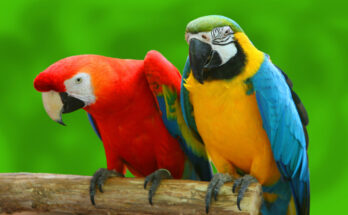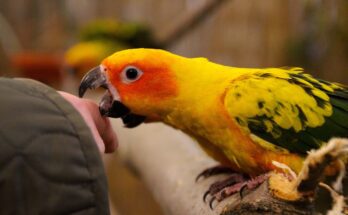Parrots are among the most intelligent, colorful, and affectionate pet birds you can bring into your home. But owning a parrot isn’t just about enjoying its beauty and playful nature — it’s a long-term commitment that requires proper care, attention, and understanding of its unique needs.
Whether you have a tiny budgerigar or a majestic macaw, the basics of parrot care remain the same. In this guide, we’ll cover 7 essential tips to help you create a loving, safe, and healthy environment for your feathered friend.
1. Choose the Right Cage Size and Location
A parrot’s cage isn’t just a “place to stay” — it’s their personal home and safe space. Choosing the right cage is the first step to ensuring your parrot’s well-being.
Tips for Choosing a Cage:
- Size matters: The bigger, the better. Your parrot should be able to stretch its wings fully and move around freely without feeling cramped.
- Bar spacing: Make sure the bars are spaced appropriately for your parrot’s size to avoid injury or escape.
- Location: Keep the cage in a well-lit, draft-free area where your parrot can interact with family life, but avoid noisy kitchens or areas with strong fumes.
Pro Tip: A happy parrot has a cage that’s at least twice its wingspan in width and height.
2. Provide a Balanced and Nutritious Diet
Just like humans, parrots need a well-balanced diet to thrive. Feeding them only seeds is a common beginner mistake that can lead to nutritional deficiencies.
Healthy Food Choices for Parrots:
- Fresh fruits: Apples, grapes, bananas, mango, and berries (in moderation).
- Vegetables: Carrots, spinach, broccoli, bell peppers, and peas.
- Pellets: High-quality parrot pellets should make up around 60-70% of their diet.
- Nuts and seeds: Offer as occasional treats, not daily meals.
Avoid avocado, chocolate, caffeine, alcohol, and salty foods — they are toxic to parrots.
3. Keep Them Mentally Stimulated
Parrots are highly intelligent birds with a natural need for mental stimulation. Without enough mental activity, they can become bored, stressed, or even aggressive.
Ways to Keep Your Parrot Engaged:
- Offer chewable toys, puzzle feeders, and ropes.
- Rotate toys regularly to keep things exciting.
- Teach them simple tricks or words — many parrots love learning!
- Give them safe branches to climb and chew.
A bored parrot is more likely to develop destructive behaviors like feather plucking or excessive screaming, so keep playtime a daily habit.
4. Maintain Good Hygiene and Cleanliness
A clean environment is crucial for your parrot’s health. Dirty cages can lead to infections, respiratory issues, and other health problems.
Cleaning Routine:
- Daily: Remove leftover food, replace water, and clean perches.
- Weekly: Wash the cage bottom, toys, and food/water bowls with bird-safe cleaners.
- Monthly: Deep clean the entire cage, including bars and corners.
Always avoid strong chemical cleaners — opt for mild soap or vinegar solutions instead.
5. Schedule Regular Vet Visits
Parrots may hide signs of illness until it’s serious. That’s why regular check-ups with an avian veterinarian are essential.
Health Care Tips:
- Get a full health check-up once a year.
- Watch for signs of illness like lethargy, appetite loss, drooping wings, or unusual droppings.
- Keep nails and beaks trimmed if they don’t wear down naturally.
Finding an avian specialist rather than a general vet can make a big difference in your parrot’s long-term health.
6. Provide Social Interaction and Bonding Time
Parrots are social creatures that form strong emotional bonds with their owners. They need daily interaction to remain happy and well-adjusted.
Bonding Ideas:
- Spend time talking, singing, or whistling with your parrot.
- Offer gentle head scratches if they enjoy it.
- Let them perch on your hand or shoulder for short periods.
Note: Every parrot has its own personality. Respect their boundaries and give them space if they seem nervous or tired.
7. Allow Safe Out-of-Cage Time
Parrots need exercise just like humans. Keeping them in a cage 24/7 can lead to physical and emotional problems.
Safe Free-Flying or Playtime Tips:
- Choose a safe, escape-proof room.
- Remove toxic plants, electrical cords, and small objects they could swallow.
- Supervise closely to prevent accidents.
If flying indoors isn’t an option, a play stand or gym can give your parrot a safe space to move and explore.
Final Thoughts on Parrot Care
Caring for a parrot is a joyful but long-term responsibility. These intelligent, sensitive birds can live for decades when given proper care, love, and attention. By following these 7 tips — from providing a healthy diet and mental stimulation to maintaining a clean environment — you’ll create a safe, happy, and enriching life for your feathered friend.
Call to Action
If you’re ready to give your parrot the best life possible, start today by making small, consistent changes to their daily care routine. And if you found this guide helpful, share it with fellow parrot lovers or join our bird care newsletter for more tips, tricks, and expert advice.




